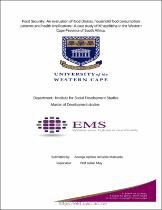| dc.contributor.advisor | May, Julian | |
| dc.contributor.author | Mabusela, Abonga Aphiwe Athabile | |
| dc.date.accessioned | 2023-07-24T10:54:08Z | |
| dc.date.available | 2023-07-24T10:54:08Z | |
| dc.date.issued | 2023 | |
| dc.identifier.uri | http://hdl.handle.net/11394/10408 | |
| dc.description | Magister Artium (Development Studies) - MA(DVS) | en_US |
| dc.description.abstract | Many factors result in a shift in food consumption patterns. These include uncertain food production, unequal food distribution, changing food markets, food inflation and fast urbanization (Cockx et al., 2019). All of the above have been prevalent in the past decades and are still persistent today. These factors have not only intensified but have shown a rise in food related health issues and issues of food insecurity. | en_US |
| dc.language.iso | en | en_US |
| dc.publisher | University of the Western Cape | en_US |
| dc.subject | Food security | en_US |
| dc.subject | Obesity | en_US |
| dc.subject | Public health | en_US |
| dc.subject | Nutrition security | en_US |
| dc.subject | Western Cape | en_US |
| dc.title | Food Security: An evaluation of food choices, household food consumption patterns and health implications: A case study of Khayelitsha in the Western Cape Province of South Africa. | en_US |
| dc.rights.holder | University of the Western Cape | en_US |

